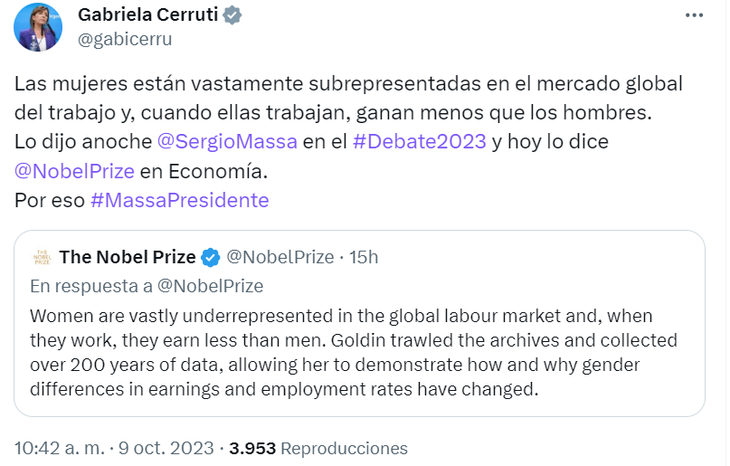New York economist Claudia Goldin received the award for her research on gender differences in the workplace. In Argentina, a man can earn up to 25% more than a woman, according to an official study. The look of the candidates for the Presidency.
The American economist Claudia Goldinprofessor at Harvard University, was awarded the Nobel Prize in Economics for her studies linked to female underrepresentation in the labor market and wage gap. The topic was not absent in the last presidential debate. Official Argentine agencies capitalized on the news to respond to the position of candidate Javier Milei, with official data on this problem.
The content you want to access is exclusive to subscribers.
The announcement was made by the Royal Swedish Academy of Sciences, which highlighted that, despite modernization, economic growth and the increase in the proportion of employed women in the 20th century, “For a long period of time the wage gap between women and men barely closed.” In turn, they highlight that Goldin provided “the first complete account of women’s income and participation in the labor market over the centuries.” The awarding of the Nobel Prize makes the economist the third woman to be honored with this prize.


From Peronism they cited the recognition by the Swedish Academy to counterargue the version of the La Libertad Avanza candidate, Javier Milei.who in the first debate stated that if inequality existed, only women should work in a company, however, “there are half men and half women.” The presidential spokesperson, Gabriela CerrutiAfter the news he tweeted: “Denying the gender gap, climate change and genocide is going against the grain of the world and the advancement of science.”
cerruti.PNG

In an interview with the newspaper El País, the pioneer in the analysis of the gender gap assured that the origin of this problem transcends discrimination: “There is something else,” she slipped in June 2019. According to her research, the unequal distribution of time and availability leans in favor of male workers. “Men are disproportionately available to work long hours at work, while women are disproportionately available to devote themselves to household chores. “That is the other side of the coin of inequality in the couple,” she argued.
What is happening in Argentina with the gender gap?
In Argentina, the phenomenon raised by Goldin is also evident. According to a report from the Ministry of Women, Gender and Diversity, Women participate less in the world of paid work, with a gap of 18.7 percentage points compared to men (52.2% versus 70.9% respectively). It is worse reflected in salaries: Women earn incomes that, on average, are 25% lower than those of men. This gap widens to 36.5% in the case of informal salaried employment. At the same time, the informality rate reaches 39.3% of women but 34.6% of men, while moonlighting is the option for 11.7% of all employed women versus 6 .2% of men in the same position. That is to say: female workers work less, are poorer and are more exposed to job insecurity. This inequality causes women to be relegated to branches of activity with lower remuneration, such as Education or care work.
The minister and candidate of Union for the Homeland (UP) Sergio Massa raised this issue in the last debate and assured that women “are discriminated against for their work” and that is why will promote the obligation for companies to pay the same remuneration for the same task.
For Lucia Cirmi, Undersecretary of Equality Policies, the wage gap “is not a discount sign that we hang up to get hired, but a photo of our wallet at the end of the day.” Although he clarifies that in Argentina for two people to be paid differently for the same work is illegal, he understands that the problem is caused by “working fewer hours, taking on more care, promoting less, and being in sectors that society values less and “It pays less, among other things because they are feminized sectors.” Furthermore, she denies that the payroll of workers is divided equally, because women “do not have as much time available (to be employed) because they are caring.”
Source: Ambito




